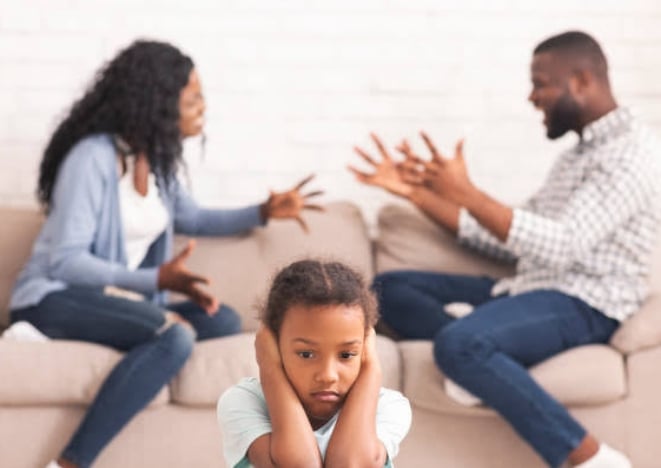Divorce is a touchy subject that affects not only the parents but also the children psychologically, emotionally, academically, and socially.
Although some children tend to react to their parents’ split understandably. But for some, it will take time to understand the situation due to factors like gender, age, and sometimes the temperament of the child.
These factors also determine how much the kid will be affected.
However, they will be affected, and one or more of these will be noticed.
- Anger or irritability
In most cases, children do not know how to express their feelings.
So in the case of divorce, some kids tend to react to their parents’ separation by getting angry at themselves, their parents, siblings, friends, and others.
However, this kind of anger can persist for a year or two. But if it lingers after the second year, you should then consider seeking the help of a counselor for your child.
- Poor academic performance
Divorce causes distraction and confusion in children which further affects their performance academically.
The more they get stressed and distracted by the situation, the more their academic performance is affected poorly.
A 2019 study suggested kids from divorced families tend to have trouble with their academic performance if the split was unexpected, whereas children from a home where the divorce was likely didn’t have the same outcome.
The study added that children from broken homes tend to have poor educational outcomes than children whose parents stay married.
- Loss of faith in marriage
This is also one of the effects of divorce on children whereby it affects their love life in the future.
Since they witnessed their parents’ failed marriage, they then feel the “institution” is worthless and won’t have any belief in getting married. They will also be so scared of commitment.
Even though, these kids try all their best to avoid their parents’ mistakes the stakes of them getting caught up in the “divorce cycle” remain high.
- Feelings of guilt
This is common in children of divorced couples because, at this time, they are looking for the answer to “what’s happening?”, “Why are my parents separating?”.
So this feeling of guilt comes in when they think they have something to do with their parents’ failed marriage.
This might, however, leads to pressure, depression, stress, or other mental health issues.
- Loss of interest in social activities
Parents’ separation affects children socially as well. It tends to get hard for them to relate with people, and have social contacts.
They also feel insecure when they try to be social which further affects their self-esteem and confidence.
- Behavioral problem
Children whose parents are divorced tend to engage in destructive and risky behavior.
Kids caught up in this situation might frequently be involved in conflict with their peers or they should experience conduct disorder, and delinquency while adolescents tend to engage in crimes like sexual activities, drugs, etc.
With the aforementioned examples, if you think you can still work on your marriage and avoid divorce, please do for the sake of your children.
However, if you’re in an abusive or unhealthy marriage where divorce is needed, take the step.
FIVE TIPS TO HELP REDUCE DIVORCE EFFECTS ON CHILDREN:
- Co-parent peacefully
Note that heated conversations and arguments should not be taken place in front of the kids.
Also, avoid bad-mouthing one another when the child is around. No matter how mild the comment is, there’s a chance the child will interpret it in another way and may even blame themselves.
Research has proven that kids adjust poorly to divorce when they witness their parents’ battle.
So take time to strategize on how to co-parent your children peacefully and lovingly.
- Make them feel safe
The fear of abandonment is mostly the cause of anxiety and other mental health issues affecting kids after divorce.
If you can take your time to make them feel loved, safe, and secure even after divorce, the effects won’t take a big toll on them.
Children from broken homes who feel loved and secure are also less likely to experience mental issues.
- Teach them coping mechanism
After letting your child know about your decision with respect to the separation, teach them how to cope.
Educate them on problem-solving skills and also how to manage their emotions, thoughts, and feelings in a healthy manner.
- Listen to your children
The most effective way you can help minimize the impact of divorce on your children is by being attentive to all of their words and actions.
See the situation from their point of view, and remember the impact on them. Adjust your behavior and the way you communicate to their reaction.
You also have to place the feelings and needs of your child above your feelings and considerations as parents.
- Maintain healthy relationship
Yes, even after the divorce. For the sake of your children, you both should learn how to have positive and healthy communication and rapport especially when the children are around.
Give them parental warmth and care which will help them adjust well to the situation and also reduce the effects on them.
TheCable Lifestyle also examined five ways children can benefit from a divorce here.
If all of these suggestions didn’t help, then you should seek the help of a professional.
Copyright 2024 TheCable. All rights reserved. This material, and other digital content on this website, may not be reproduced, published, broadcast, rewritten or redistributed in whole or in part without prior express written permission from TheCable.
Follow us on twitter @Thecablestyle

